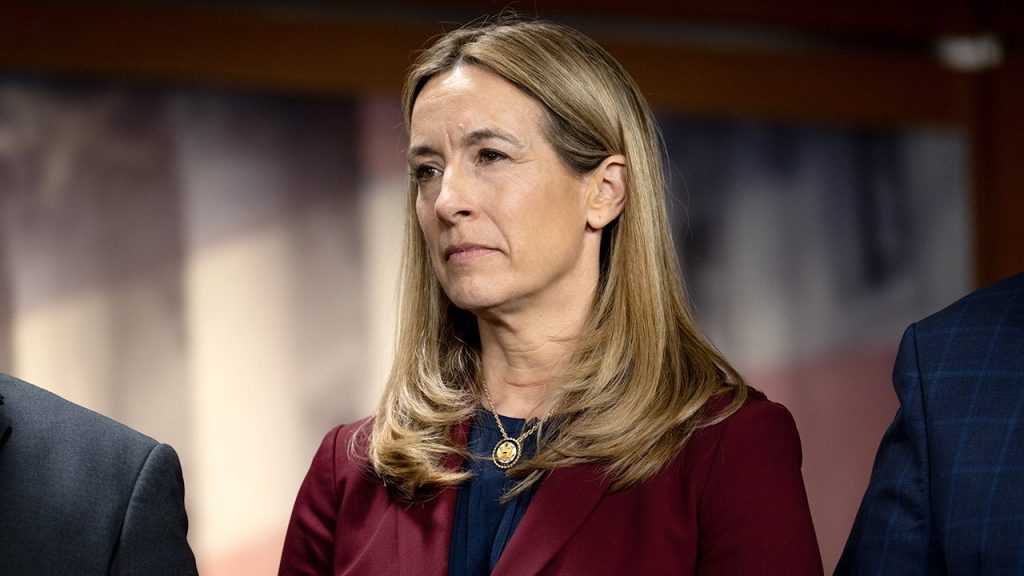Veteran Congresswoman’s Military Records Improperly Released: National Archives Apologizes
In a concerning breach of privacy that has sent ripples through both military and political circles, the National Archives recently issued a formal apology to Democratic Representative Mikie Sherrill after her confidential military records were inappropriately released to an unauthorized individual. The incident has raised serious questions about the protection of veterans’ personal information and ignited heated exchanges in an already contentious New Jersey gubernatorial race. The breach included the exposure of highly sensitive information, including Sherrill’s Social Security number, to Nicholas De Gregorio, who has connections to Sherrill’s Republican opponent Jack Ciattarelli’s campaign. While the unauthorized release has been characterized as “exceedingly rare” by National Archives officials, it highlights vulnerabilities in the systems designed to protect those who have served our country and raises concerns about whether political motivations may have played a role in compromising a veteran’s privacy.
The details of the breach emerged when Scott Levins, Director of the National Personnel Records Center (NPRC), sent Sherrill a letter acknowledging the serious error. “On behalf of the National Archives, I sincerely apologize for the inconvenience and aggravation this situation may cause you and for our failure to safeguard your military record from unauthorized release,” Levins wrote in the letter, which Sherrill’s campaign subsequently shared publicly. According to Levins, when responding to a Freedom of Information Act request submitted by De Gregorio, NPRC staff inappropriately released Sherrill’s “comprehensive official record,” including her Social Security number and date of birth. The NPRC has offered Sherrill free credit monitoring services and promised to hold staff accountable for failing to follow proper protocols. Additionally, the agency has committed to reviewing its policies and implementing stronger controls to prevent similar breaches in the future, along with providing additional training to reinforce their commitment to protecting veterans’ personal information.
The political dimensions of this privacy breach quickly came to the forefront as details about the requestor’s connections emerged. CBS News identified Nicholas De Gregorio as an ally of Republican gubernatorial candidate Jack Ciattarelli, who is running against Sherrill in the New Jersey governor’s race. In comments to the media, De Gregorio acknowledged that Chris Russell, a Republican consultant in New Jersey, had asked him to investigate what he could find about the Democratic lawmaker. However, De Gregorio maintained that Ciattarelli’s campaign had not hired or encouraged him to access these materials. This connection has raised questions about political motivations behind the records request, though the exact circumstances remain somewhat unclear. The incident adds another layer of complexity to an already heated gubernatorial contest, with Ciattarelli seeking to avenge his narrow 2021 loss to Democratic Governor Phil Murphy.
Representative Sherrill responded forcefully to the breach, characterizing it as an “illegal and dangerous weaponization of the federal government” in a post on X (formerly Twitter). “That @Jack4NJ and the Trump admin are breaking the law and exposing private records for political gain is a violation of anyone who has ever served. No veteran’s record is safe,” she asserted, directly implicating her political opponent in the controversy. Sherrill’s strong language reflects both the personal violation she experienced and the broader concerns about veteran privacy this incident has raised. As a veteran herself, Sherrill’s military service has been part of her political identity, making this breach particularly resonant. The congresswoman’s response suggests she views this not just as a personal privacy violation but as an attack that could potentially affect all veterans whose sensitive information is held by government agencies.
The controversy has drawn in former President Donald Trump, who has endorsed Ciattarelli in the gubernatorial race. In a post on his Truth Social platform, Trump criticized Sherrill as “close to incompetent,” even misspelling her first name as “Mike” in his commentary. Trump’s involvement amplifies the partisan dimensions of the incident, transforming what should primarily be a matter of government accountability and veteran privacy into another battleground in the ongoing political divide. The former president’s support for Ciattarelli has been a significant factor in the race, bringing national attention to what would otherwise be a state-level contest. This additional layer of national political involvement complicates efforts to address the underlying privacy concerns objectively and ensure proper protections are in place for veterans’ records.
This troubling incident raises broader questions about the systems in place to protect veterans’ personal information and the potential for misuse of government resources for political purposes. While the National Archives has characterized this breach as an anomaly, the fact that it happened at all reveals vulnerabilities that must be addressed. Veterans entrust the government with their most sensitive personal information as a condition of their service, and they deserve the highest levels of protection for that data. Beyond the immediate political implications, this case serves as a sobering reminder of the ongoing challenges in safeguarding personal information in an increasingly digital age. As investigations continue and the National Archives implements promised reforms, the broader public interest lies in ensuring that those who have served our country can trust that their personal information remains secure, regardless of their political affiliations or public profiles.


